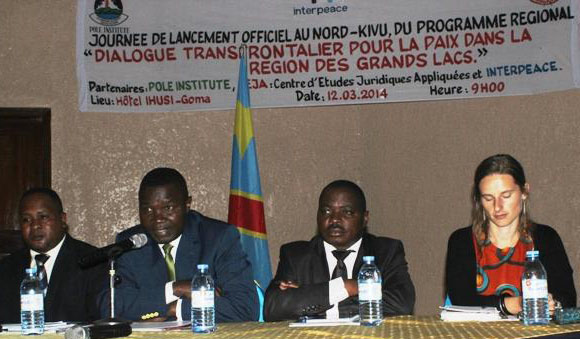Great Lakes programme launched in the region

To announce the establishment of Interpeace's Great Lakes Programme, launch events across Rwanda, Burundi and the Democratic Republic of Congo (DRC) were held by our local partners to mark this positive step towards peace throughout the region.
"This programme comes at a moment when we really need it. We invite all people and leaders of the countries of the Great Lakes region to frankly and openly speak to each in order to build lasting peace, given that we will forever remain neighbours," said Julien Paluku, Governor of DRC's North Kivu province during the launch event in Goma.
Launch of the Regional Programme in the North Kivu province
On 12 March, 2014 the Great Lakes Programme was officially launched in the North Kivu province in the DRC. "This launch was important for building legitimacy of the programme and for informing key partners of their role in the process of research and dialogue," says Onesphore Sematumba of the Goma-based Pole Institute, one of Interpeace's partner organizations in the region. The programme was also launched through events in DRC's South Kivu province on 14 March 2014, in Burundi's capital Bujumbura on 26 March 2014 and in Rwanda's capital Kigali on 12 December 2013.
Addressing identity-based stereotypes and manipulations
At the events, data was presented from a research study conducted by our local partners on identity-based stereotypes and manipulation throughout the region. The research serves the foundation on which the programme is being developed. Participants at the launch events had the opportunity to share opinions and discuss their ideas on how stereotypes impact peace in their lives and communities. They were also able to provide input on some of the objectives of the programme. Pacifique Borauzima, the Interpeace Coordinator for the DRC, added: "We wanted to explain the approach of the programme from the beginning and build local ownership into the programme." The North Kivu launch also marked the efforts of more than ten years of work in Burundi and Rwanda that has now expanded into the Democratic Republic of Congo.
Establishing cross-border dialogue
"Based on our experience in the region, we realized that many of the issues have cross border impacts and are not confined to just one country," explains Johan Svensson, Interpeace's Regional Director for Eastern and Central Africa. "After examining the regional dynamics, we also discovered that populations were highly suspicious of their neighbouring countries," he adds. Based on those results, the programme aims to establish dialogue across the borders between citizens of the region to restore confidence and trust within each other.
The Great Lakes Regional Peacebuilding Programme
As a way to reduce the cross border tensions, the Great Lakes Programme was created to bring together people from Burundi, Rwanda, and the DRC to help build sustainable and unified peace across the region.
Today, Interpeace has been working with six partners in the region: the Center of Alert and Conflict Prevention (CENAP) in Burundi, the Institute of Research and Dialogue for Peace (IRDP) in Rwanda, and most recently the Pole Institute and the Center of Applied Judicial Sciences (CEJA) in North Kivu, Action for Peace and Unity (APC) and the Network of Organizational Innovation (RIO) in South Kivu.
Working with all levels of society
The objective of the programme is to serve as a channel for conflicting groups to come together for inclusive, trans-border dialogue to increase trust between each other. The programme also seeks to use dialogue to bring together all levels of society. To achieve this, the programme has targeted four intervention groups: decision-makers, civil society organizations, community members, and regional institutions. By working to build dialogue between these groups, the programme believes trust can be rebuilt.
Interpeace Coordinator for the North and South Kivu Provinces, Pacifique Borauzima Buluhukiro said: "We must consider perceptions and establish consensus on peacebuilding priorities. Those perceptions will be different for each person, so that is why we need to meet, discuss solutions in trans-border dialogue groups. This in return will reduce the differences between grassroots communities and decision-makers."
The Great Lakes Programme will also begin conducting participatory action research with various stakeholders to deepen its understanding of the causes of mistrust in the region. The results will be used to propose consensus-based solutions to decision-makers so they can take into account the concerns and opinions of the local populations in the region.
